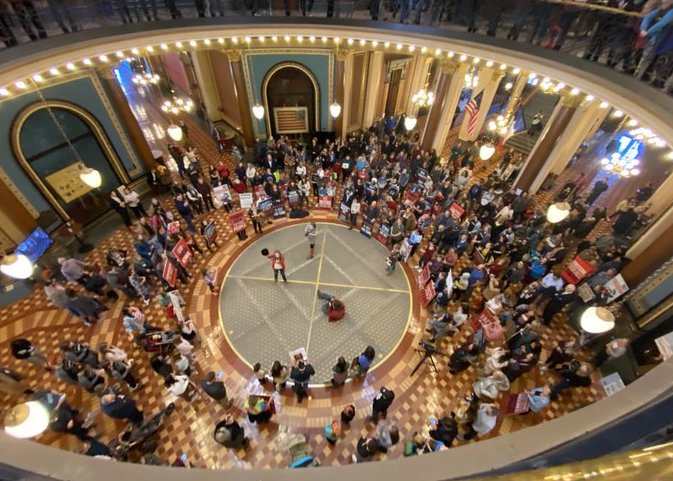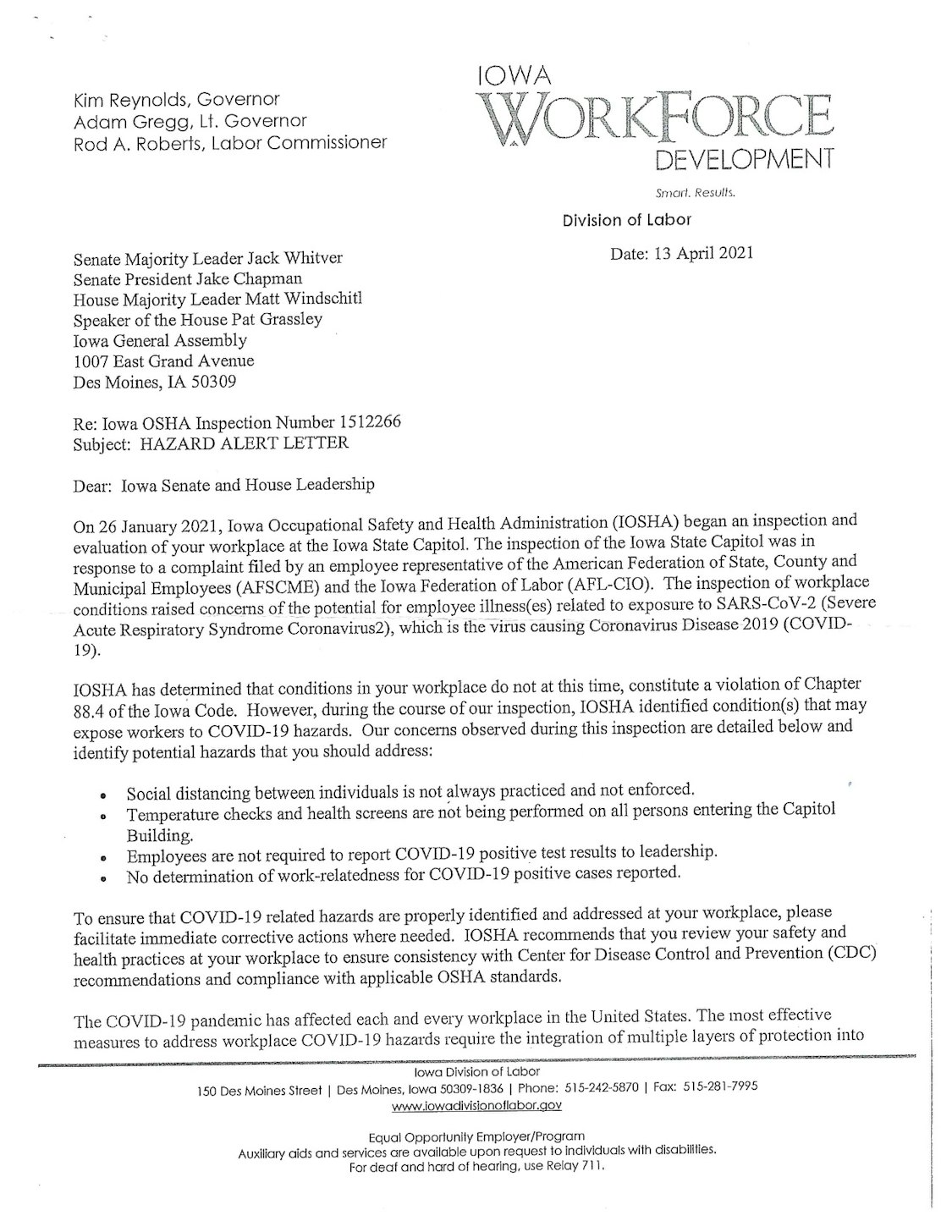Eleven weeks after beginning to inspect workplace safety at the Iowa capitol, the state’s Occupational Safety and Health Administration (OSHA) informed legislative leaders about conditions “that may expose workers to COVID-19 hazards.” OSHA recommended “immediate corrective actions where needed,” as well as a review of safety and health practices “to ensure consistency” with advice from the U.S. Centers for Disease Control guidelines
What took them so long?
“POTENTIAL HAZARDS THAT YOU SHOULD ADDRESS”
Several labor organizations filed an OSHA complaint on January 21, ten days after the beginning of the Iowa legislature’s 2021 session. They noted that protocols Republican leaders had adopted did not require face coverings for capitol employees or visitors, nor did they require people who work at the statehouse to report a positive coronavirus test.
The inspection began on January 26, according to OSHA’s letter to GOP leaders. Lawmakers spotted inspectors in the capitol on January 27, and a letter listing five citations for hazards unrelated to COVID-19 mentioned violations observed between January 26 and January 28.
The April 13 “hazard alert letter” from Iowa OSHA administrator Russell Perry to Senate Majority Leader Jack Whitver, Senate President Jake Chapman, House Speaker Pat Grassley, and House Majority Leader Matt Windschitl identified the following four “potential hazards that you should address”:
- Social distancing between individuals is not always practiced and not enforced
- Temperature checks and health screens are not being performed on all persons entering the Capitol Building
- Employees are not required to report COVID-19 positive tests results to leadership
- No determination of work-relatedness for COVID-19 positive cases reported
OSHA didn’t issue citations for the COVID-19 hazards, because the agency hasn’t established any regulations specifically related to the pandemic. The letter (enclosed in full below) also didn’t mention the lack of a mask mandate at the capitol, though it did show an illustration of layered mitigation strategies, including “masks or other PPE.” Democratic lawmakers advocated for mandatory face coverings during the legislative session and have repeatedly noted that many Republican legislators and staff don’t wear masks consistently.
OSHA’s letter also didn’t mention contact tracing. The Iowa legislature’s protocols call for contact tracing following positive cases reported, but some Democrats have questioned whether that is happening. Asked last week whether contact tracing occurred following the most recent case reported for the Iowa Senate, secretary of the Senate Charlie Smithson referred Bleeding Heartland to the written protocols.
Since January, legislative staff have announced eight confirmed COVID-19 cases associated with the Iowa House and two associated with the Iowa Senate. Since reporting is not mandatory, the real number of people connected to the legislature who have tested positive is unknown.
In a separate letter, OSHA proposed fines totaling $10,439 for hazards including an uncovered electrical outlet. The agency offered to cut those fines in half if the legislature corrected the problems promptly and complied with other settlement terms.
GOP LEADERS SPIN FINDINGS AS VINDICATION
Iowa Federation of Labor AFL-CIO president Charlie Wishman shared the OSHA letters with the news media on April 19, saying legislative leaders “need to act before more people get sick, or something worse happens.” Wishman told the Des Moines Register that the agency’s hazard alert letter “basically says while we can’t cite you for this, you need to do something about your COVID mitigation procedures because it doesn’t seem like you’re doing what’s necessary to keep people safe.”
Legislative leaders didn’t acknowledge they could be doing anything more to limit spread of the virus at the statehouse. Melissa Deatsch, communications director for Iowa House Republicans, said in a written statement,
The worst infraction this politically contrived investigation could find was a missing faceplate for an outlet. Leadership has taken extensive efforts since January to mitigate the spread of COVID-19 and will continue to do so for the remainder of the 2021 Legislative session.
Senate Majority Leader Whitver was even more defiant in his written comment:
The results of the recent OSHA investigation confirmed the protocols put in place in the Iowa Senate complied with the law. The Iowa Senate has maintained transparency and public access to the lawmaking process, while also implementing protocols to mitigate the risk of contracting and spreading the coronavirus. Over the course of more than 14 weeks, the Iowa Senate has been notified of only two positive cases and the measures in place are working.
The report noted it was possible to contact the coronavirus in the Capitol. This fact, of course, is also true of nearly any other activity in the world.
Despite the politically motivated, and now unfounded complaint from Danny Homan and Charlie Wishman, the coronavirus protocols in the Iowa Senate did not receive any citation or fine. I look forward to completing the 2021 Iowa Legislative Session in the coming weeks and delivering on tax relief, a fiscally sound budget, and pro-growth policies for working Iowans.
Contrary to Whitver’s spin, OSHA’s hazard alert letter didn’t merely say “it was possible to contact the coronavirus in the Capitol.” The agency named specific conditions “that may expose workers to COVID-19 hazards,” adding,
To ensure that COVID-19 related hazards are properly identified and addressed at your workplace, please facilitate immediate corrective actions where needed. IOSHA recommends that you review your safety and health practices at your workplace to ensure consistency with Center for Disease Control and Prevention (CDC) recommendations and compliance with applicable OSHA standards.
OSHA administrator Perry encouraged legislative leaders to implement steps described on OSHA’s website “to eliminate or materially reduce worker exposure to COVID-19 hazards in your workplace.”
In written statements on April 19, House Minority Leader Todd Prichard called on Republican leaders to take OSHA’s recommendations seriously, while Senate Minority Leader Zach Wahls again criticized the legislature’s insufficient COVID-19 safety protocols. In a Zoom call with journalists on April 15, Prichard questioned whether GOP lawmakers have been reporting all positive tests for the virus, and Wahls said he was not confident that contact tracing was being conducted in all cases.
That top House and Senate Republicans are brushing off OSHA’s findings is not surprising. But why did the agency wait so long to suggest these “immediate corrective actions”?
“THE LEGISLATIVE CALENDAR IS NOT UNDER OUR CONTROL”
Eleven weeks passed between OSHA inspectors scrutinizing the state capitol and Perry sending the hazard alert letter to legislative leaders.
It’s well known that the legislature’s session usually ends in late April, and that most committee meetings and larger events drawing Iowans to the capitol (such as lobby days) occur from January through March. This calendar shows some of the public events held at the capitol this year, but it’s not an exhaustive list. Hundreds of people who oppose COVID-19 mitigation measures rallied at the capitol on January 11, carrying signs opposing masks and chanting slogans in the rotunda. Under the legislative protocols, they were not required to maintain social distancing or wear face coverings.
I sought comment from the Iowa Department of Labor: couldn’t OSHA have recommended “immediate corrective actions” regarding COVID-19 safety sooner, even while working on a formal report on other citations?
Kathleen Uehling, attorney for Labor Commissioner Rod Roberts, responded via email on April 20,
Inspections are performed according to the procedures set forth in our Field Operations Manual. If a single inspection results in both a Citation and Notification of Penalty and a Hazard Alert Letter, we typically issue both documents together. We have up to six months to issue citations. The legislative calendar is not under our control, nor does it dictate our schedule.
Uehling didn’t answer follow-up questions.
Of course OSHA doesn’t control the legislative calendar. Nevertheless, everyone in state government knows the capitol building is far more crowded from January through March than at any other time of the year.
Typical practice may be for OSHA to issue citation and hazard alert letters together, but in the interest of public safety, the agency should have expressed its desire for “immediate corrective actions” to reduce COVID-19 exposure at the statehouse as soon as possible, instead of in mid-April when legislators had nearly finished their work for the year.
During the Democratic leaders’ April 15 Zoom call with reporters, Wahls mentioned the long wait for a report following OSHA’s inspections at the capitol. “It’s not just lawmakers who are at risk, it’s everybody who comes into that building,” he noted. “Is the governor’s office slow-walking that investigation? We don’t know,” Wahls said.
That topic didn’t come up at Governor Kim Reynolds’ latest news conference on April 21, but the question warrants further digging.
UPDATE: While delivering a point of personal privilege on April 21, Democratic State Senator Rob Hogg questioned Whitver about what had been done in response to OSHA’s letter. Whitver stuck to his story, claiming the letter only said people could get COVID at the capitol, which is true of any place. Hogg then read passages from the letter that cited specific problems and recommended corrective actions. Whitver asserted that despite Democratic complaints, the Senate had conducted business safely all year. He characterized the OSHA complaint and controversy as a “a political hit job, trying to get us to not have session and not keep moving the state forward.”
Hogg asked in frustration, “Did you listen to what I just read? That was in the letter. […] And you’re just ignoring it. You’ve done nothing.” At that point, Republican Senator Brad Zaun called a point of order on him, saying he had disparaged Whitver’s motives. I pulled this clip from the chamber’s official video:
Following a reminder from Senate President Jake Chapman about “obedience to all rules of debate,” including “decorious and respectful remarks,” Hogg asked GOP colleagues to reread the letter from OSHA and see what they could do to make the statehouse a safer workplace for everyone.
Appendix: Two-page hazard alert letter from Iowa OSHA to state legislative leaders on April 13
Top image: Photo of “Informed Choice Iowa” rally in the state capitol rotunda on January 11, 2021, posted on Twitter by State Senator Joe Bolkcom.



